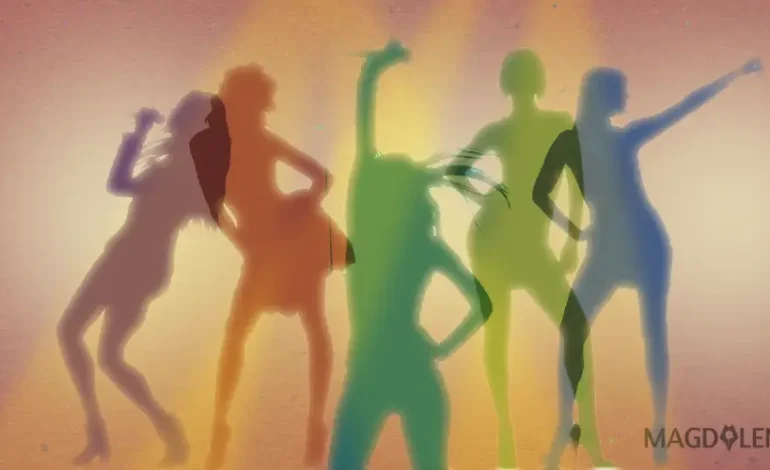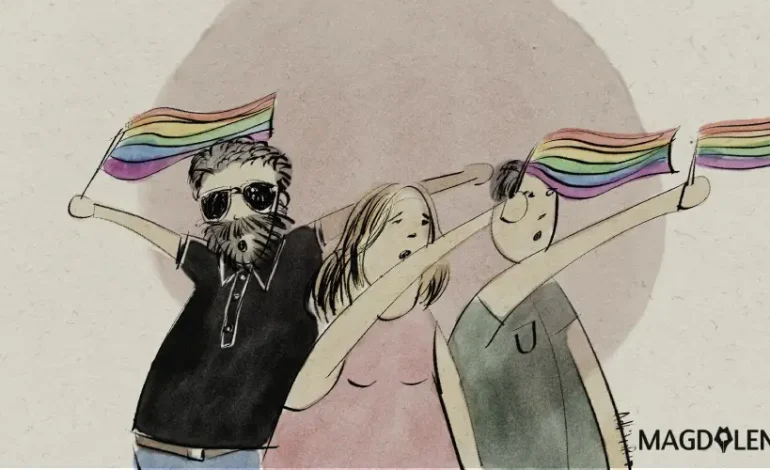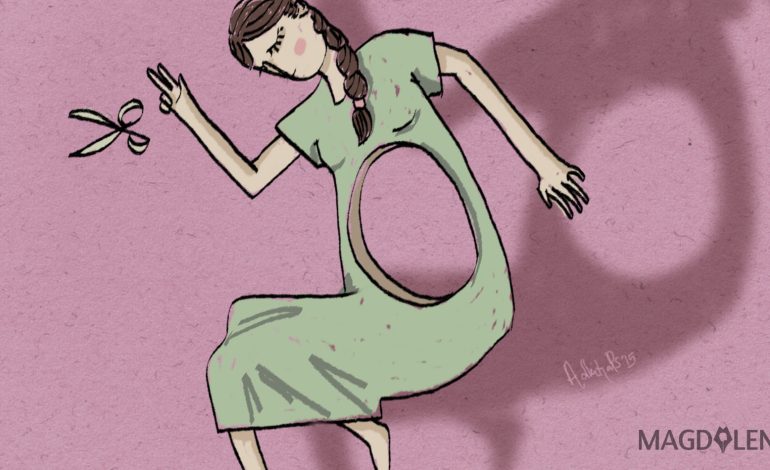Nicki-Taylor, Race and Body Image

On the day the Internet was set alight by Nicki vs Taylor, my circle of China watchers applauded Taylor Swift. Not for what she said, but what she is selling.
Official merchandise related to her album 1989 is due for sale in China, and a predicament is predicted. The year 1989 was the time of Tiananmen Square protests, which is still a taboo topic in China. But since it is unmentionable, what would prevent people in China from sporting “1989” or worse, “T.S. 1989” in public places? Certainly it’s not Mr. and Ms. Swift’s fault that Taylor was born in 1989, and it’s not her fault that she’s really popular in China.
But for the rest of the world, she is a self-centered diva who brought her own trouble, while showing her true color. She could have just ignored Nicki Minaj’s tweets, which don’t mention her. She made things worse by saying to Nicki “If I win, please come up with me!! You’re invited to any stage I’m ever on.”
Everyone agrees that the problem is literally black and white. Between a black woman frustrated for not being appreciated and a white woman clueless about what’s going on (face it, Taylor replied to Nicki’s tweet because she felt Nicki slighted her). This controversy came just days after another one surrounding media treatment for Serena Williams over a similar issue: a black woman cannot be both successful and #curvy.
But what makes this complicated is both artists can be identified as feminists. Yes, the supposed serial girlfriend and the supposed lap dancer are both feminists! Taylor supported Emma Watson’s United Nations speech on gender equality and is Lena Dunham’s bestie, while Nicki’s unabashed celebration of sexuality has made her some people’s feminist hero.
Among feminists, however, this case is a good example of what’s going on internally. Women of color (WOC) feminists believe that the mainstream narrative of feminism ignores their multiple minority status – their struggles are not only against sexism but are also against racism, against both men of their community who accuse them of “going white”, and against naive white women who believe that progress experienced by white women is progress experienced by all women.
This is why black feminists are more skeptical about Sheryl Sandberg’s “Lean In” movement. She is Jewish, a despised minority in the United States merely 100 years ago. But today she and most other Jewish Americans are seen as white Americans too. There’s even a view that Silicon Valley can tolerate white female leaders like Yahoo’s Marissa Mayer and Sandberg, but not a woman of color such as Ellen Pao.
So how do I feel observing the Nicki vs Taylor episode? I am more familiar with Taylor than Nicki. Certainly she is easier to find in Indonesian media. Net. Channel would find it difficult to play Nicki’s “Anaconda” video without running into trouble with the Indonesian Broadcasting Commission (KPI). On the other hand, Taylor can be seen in the Cornetto commercial and “Bad Blood” is more likely to be aired either on Net. or Channel V (not to mention lyrically halal to be performed by cover bands in high school concerts).
Our Southeast Asian world easily connects to Taylor than Nicki. It does not mean that our world just follows the white people – “Bad Blood” features Kendrick Lamar and we welcome black female artists like Rihanna, Alicia Keys, and Beyoncé. Many aspiring singers here would probably cite Janet Jackson or Whitney Houston as inspirations.
But three things may prevent Nicki Minaj from being marketable in Southeast Asia – her figure, her music, and her look. Never mind that Nicki is closer to Asia than Taylor is. She is a quarter Indian (her homeland, Trinidad & Tobago, is a melting pot where mixed marriage is normal). But while this is an interesting trivia for Indians, to my knowledge she has yet to perform in India, which has welcomed the sexuality of Lady Gaga and Taylor Swift’s philanthropy.

I am still very much a K-pop guy, and that means girl bands like Girls’ Generation and 2NE1 and solo artists like IU. Unlike their Western counterparts, Korean artists never make a political statement and never get involved in any social cause, even the “safer” ones like environmentalism. So when someone pointed out that “Bad Blood” video is too similar to 2NE1’s “Come Back Home”, I have mixed feelings.
I felt flattered because @chaelinfenty refers to 2NE1 as “a group of WOC” (meaning she acknowledges that East Asian women are part of the WOC). I also felt deceived by Taylor, another Westerner who stole an Asian’s work without credit. But I predicted that 2NE1 members, including “The Baddest Female” CL, would not response to the news, and I was correct. K-pop fans – a mixture of Asian women in Asia, Asian women in the West, and non-Asians – tried simultaneously to support both artists, to dismiss the accusation of plagiarism, while wanting to believe that 2NE1 is the better artist.
The Korean-American director of “Bad Blood”, Joseph Kahn, saw it differently. He labeled the plagiarism rumor as racism and stated that as an American, he does not listen to K-pop (personally, I believe as a music director he can do better). Director of “Come Back Home”, Shin Dong-geul, responded by apologizing to Kahn for the inconvenience, and instead criticized tweeters for causing trouble.
So much for intersectionality, eh? Kahn’s reaction is too familiar for me – Westerners from Asian background stand up for their ethnicity but not for Asian women. Shin apologized because the K-pop industry (which is a national project) does not want any trouble with Kahn, who might direct CL’s future video. K-pop media consider the case closed. 2NE1’s silence is taken for granted by their fans.
Nicki and Taylor have made peace and we have learned the lessons: Intersectionality is important as racism and sexism (and other negative –isms) are related. Think before you tweet. Feminism still takes a back seat for both Asian-Americans and Asians.
Now I feel sad and need to listen to Perfume.
Read Mario’s take on Japan’s obsession with schoolgirls and follow @mariorustan on Twitter.






















